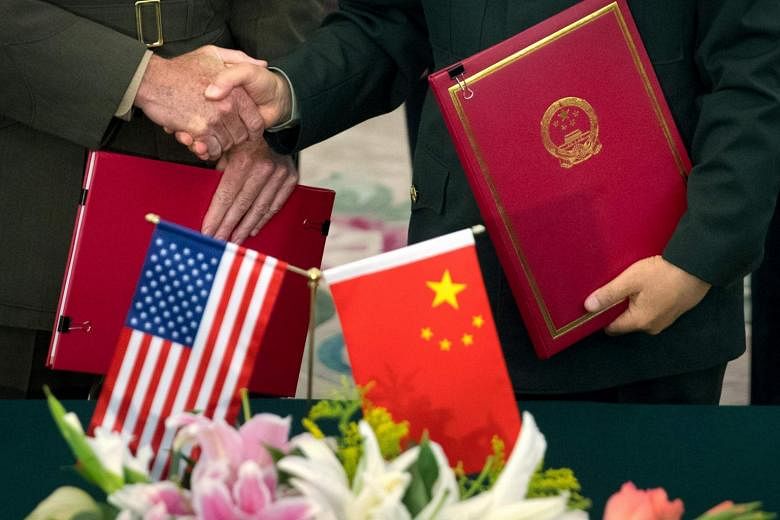BEIJING - The US and Chinese militaries have signed an agreement to open a new communication mechanism for their joint staff departments, a move officials say will reduce the risk of miscalculation.
The joint strategic dialogue mechanism was inked on Tuesday (Aug 15) at the Ba Yi, the People's Liberation Army headquarters, during a visit to China by the top US military official.
Marine Corps General Joe Dunford, chairman of the Joint Chiefs of Staff, is visiting China to further military-to-military ties between the two Pacific powers, according to the US Department of Defence.
He is scheduled to visit a military base in the PLA's Northern Theater Command on Wednesday, and to observe a military exercise by the Chinese military in the northeastern city of Shenyang.
This is Gen Dunford's first visit to China in his position as chairman of the Joint Chiefs of Staff and the highest-ranking US military official to visit China since US President Donald Trump took office.
The two militaries already have dialogue mechanisms across many military ranks and services, including the Defense Policy Coordination Talks for senior military officials, and dialogue and cooperation mechanism for the armies and navies, said Senior Colonel Zhao Xiaozhuo, a researcher at the PLA Academy of Military Science.
"But most of those mechanisms typically focus on policies, military building or exchanges on a specific issue or a branch of military," Zhao told China Daily.
"It is very important for joint staff departments, which encompass all military branches and serve as one of the backbones of military operations, to have regular exchanges. This is a very positive step in building mutual trust and cooperation."
Since the joint staff department plays a crucial role in actual combat operations, experts said the new mechanism would strengthen effective communication, reduce miscalculations and improve risk management in Asia's increasingly complex geopolitical climate.
The agreement is intended for crisis mitigation, US Joint Staff officials said, noting that direct communication at the three-star level in the Pentagon and the Ba Yi will "enable us to communicate to reduce the risk of miscalculation".
Army Lt. Gen. Richard D. Clarke, the Joint Staff's director for strategic plans and policy, will lead the effort for the American military.
The first meeting to set up the framework is set for November, according to the US Department of Defence.
These communications are especially crucial now, as the region and world are facing the dangers of a nuclear-armed North Korea, officials said.
The joint strategic dialogue mechanism grew out of diplomatic and security talks in Washington earlier this year. Those talks grew out of a Florida meeting between US President Trump and Chinese President Xi Jinping in April.
The military-to-military contacts between the United States and China are important because there will always be some friction between the two countries, Gen Dunford said, adding that military contacts will lessen the chances of a miscalculation.
General Fang Fenghui, chief of the People's Liberation Army's Joint Staff Department, said during his meeting with Gen Dunford that cooperation is the only right option for China and the US, and the two sides could be great partners.
The Chinese military is willing to work with its US counterpart to strengthen mutual understanding and trust, deepen cooperation and manage risks and differences in an appropriate and effective manner, Gen Fang said.
The two officials exchanged opinions on Taiwan, the South China Sea and the nuclear issue on the Korean Peninsula and other issues of mutual concern.
Gen Dunford's visit to China is the second of three stops in his trip to Asia. He visited the Republic of Korea on Sunday and will travel to Japan later this week.
While in Seoul, Gen Dunford said on Monday (Aug 14) America's focus in dealing with the recalcitrant North Korean regime is placed on diplomatic efforts and economic pressure.
He told South Korean president Moon Jae In military options being prepared against North Korea would be for when diplomatic and economic sanctions failed.
Tension has increased in recent months over concern that North Korea is close to achieving its goal of putting the mainland US within range of a nuclear weapon.
North Korea and the US exchanged threats of military action last week, with Pyongyang saying it will develop a plan to strike the US Pacific territory of Guam.
Security expert Zhou Bo said: "China and the US both have responsibility in maintaining regional peace in Asia.
"The new mechanism will play a significant role in exchanging ideas for dealing with major military issues in the region, which in term will reduce the chance of miscalculation and improve risk management between the two militaries," the senior colonel told China Daily.

